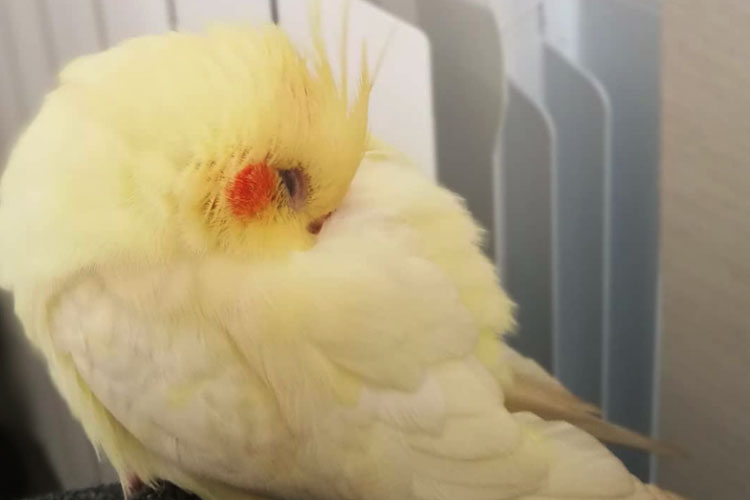One of the biggest concerns you have as a new cockatiel owner is how your cockatiel sleeps. You’ll want to understand what constitutes normal sleeping behavior and inappropriate sleeping activity. Cockatiel sleeping positions may appear strange, yet they are perfectly typical. However, it sometimes depends on various factors, e.g., the cockatiel’s age.
So, how do healthy cockatiels sleep? Cockatiels sleep with one leg lifted and their head tucked beneath their wings. Head tucking is done for warmth and safety. Some owners have noticed their cockatiels sleeping on perches, food dishes, cage sidebars, or the bottom of the cage. This is because each cockatiel has a distinct sleeping position.
Accordingly, the sleeping position of the cockatiel may also change over time owing to its age, surroundings, or health. Let’s take a closer look at a cockatiel’s sleeping arrangements.
How Do Healthy Cockatiels Sleep? What is normal and abnormal?
A healthy cockatiel’s most typical sleeping position is standing on one leg on a perch, with its head tucked beneath its wing. However, the cockatiel can sleep in other positions as well. Let’s look at each in detail.
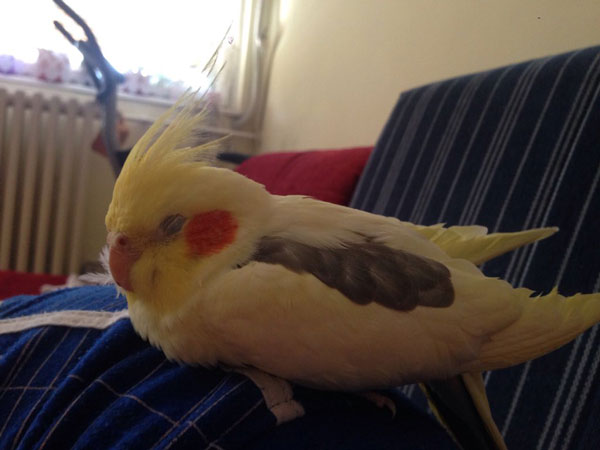
Sleeping on one leg
The most common position for cockatiels is sleeping on one leg while on a perch. This stance protects them from predators in the wild, so they also keep it in captivity. The answer is no if you’re wondering whether your cockatiel might fall. Cockatiels have strong feet that grip the perch and keep them from falling off while sleeping.
Also, while sleeping, the cockatiel raises one foot and brings it closer to its chest for a variety of reasons, they include;
- To conserve energy by resting one foot. They alternate legs to ensure that neither leg feels tired.
- To prevent heat loss via the featherless skin and to warm the leg.
- The cockatiel feels safer in this position because it can flee danger more easily when standing on one foot than when both feet are tucked beneath its wings.
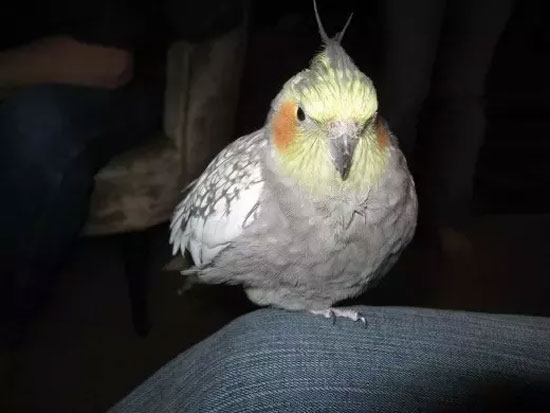
Cockatiels also sleep with their head in the wings. If you observe your cockatiel sleeping this way, it feels safe and secure. They tuck their heads for warmth, rest, and to block out the light. Thus, you may notice the cockatiel grinding its beak or fluffing its feathers when about to sleep. So the bottom line is, sleeping on one leg is normal.
Sleeping on two legs
This occasionally happens, especially during daytime naps. The cockatiel will sleep on two legs for a short while and then change back to standing on one leg when it feels safe enough.
However, if the cocktail is always sleeping on two legs, then something is wrong. It could be due to sickness or injury, so you must take it to an avian veterinarian. Overall, sleeping on two legs for a prolonged period is abnormal.
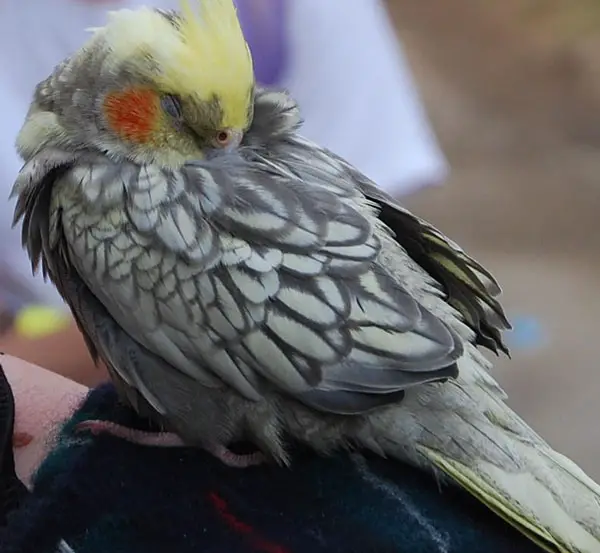
Sleeping on the bottom of the cage
A cockatiel will sleep lying down or on the bottom of the cage if there are too many cockatiels and no more accessible perch space. In other words, if the cockatiel is healthy and happy, there is no need to be concerned about this sleeping position.
On the other hand, if the cockatiel is sick, it will sleep while lying down because it lacks the stamina to stand upright or perch. You should be concerned if the cage is large enough, but the cockatiel still sleeps on the bottom.
However, baby cockatiels and old cockatiels also sleep in this position. They tuck their legs beneath their wings since they do not have the strength to stand on one leg throughout the night. So they sleep standing on one leg as they get older.
In that case, this sleeping position is to be considered normal for baby cockatiels and cockatiels in crowded cages, but it is abnormal when the cockatiel is sick.
Sleeping with eyes closed or with one eye open
Cockatiels sleep with their eyes closed when they are comfortable and secure. It may be standing on one leg with its eyes closed, indicating that the cockatiel is asleep. Sometimes, a cockatiel may close its eyes but is not asleep at times. It could simply be resting.
When a cockatiel sleeps with one eye open, it does not feel safe enough. This indicates that both of these sleeping habits are normal.
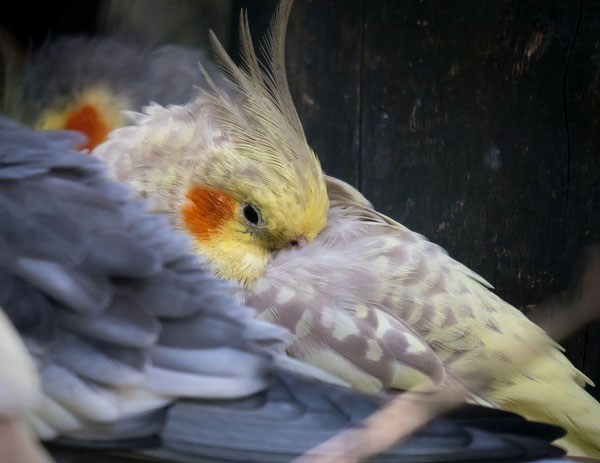
Sleeping on the cage’s side
A cockatiel may adopt this sleeping position for the following reasons:
- It attempts to flee from bright light; cockatiels require darkness to sleep.
- It attempts to warm up; if the heat source is closer to the cage’s side, the cockatiel will perch closer to that side.
- During the breeding season, a female and male cockatiel will separate from the rest of the flock.
- Some cockatiels will perch towards the cage’s sides if there are few perches and many cockatiels in the cage.
- When attempting to avoid a predator, the cockatiel will shift to the opposite side of the cage if it discovers that its usual sleeping perch is closer to a cat or dog’s resting location.
- A cockatiel will perch on the quieter side of the cage if its typical posture is near a disturbance.
- The cage’s side is the cockatiel’s favorite position.
So the most important point is, this sleeping position is normal and is brought about by circumstances or the cockatiel’s preference.
How To Ensure The Cockatiel Sleeps Well At Night.
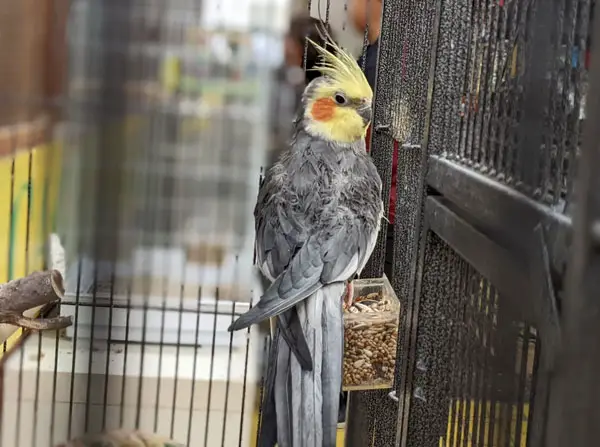
You can take the following steps to help a cockatiel have a good night’s sleep.
Place the cage in a quiet place
Like humans, cockatiels do not like sleeping when there is a lot of noise. Loud noise causes the cockatiel to be frightened, and it may fly around the cage as it tries to escape, causing danger and injuries.
Place the cage in an area with less light
Cockatiels need darkness when they sleep. So, do not place their cages near TVs or bright lights. I recommend using a cage cover to ensure the cage is dark when the cockatiel sleeps. When using a cage cover, ensure it is breathable.
Many perching areas in the cage
If you have more than one cockatiel in the cage, ensure there are plenty of perches in the cage. This will reduce territorial fights among the cockatiels, thus guaranteeing each cockatiel sleeps peacefully. Also, no cockatiel will sleep at the bottom of the cage due to a lack of perches.
Regulating the temperature of the room
Cockatiels are tropical birds. Therefore, they are used to warm temperatures. The best room temperature is 21-27 degrees celsius. Hence, it is advisable that if your cockatiels live outdoors, you should bring them in during cold seasons and harsh weather.
Maintaining the same sleeping cycle
You need to maintain a perfect sleeping cycle for the cockatiels. This is to ensure that the cockatiels get the required hours of sleep.
Use a spacious cage
A small cage might bring about territorial fights over perches and might force some cockatiels to sleep on the floor. Therefore, ensure you buy a spacious cage or separate the cockatiels and put them in different cages. This will reduce stress and conflict and ensure each cockatiel is happy and relaxed.
How Long Do Healthy Cockatiels Sleep?
A cockatiel requires 10-12 hours of sleep every day. They are diurnal, which means they sleep at night and awaken throughout the day. The cockatiel may sleep for a few long hours during the winter because the days are shorter than the nights. Also, during molting, cockatiels tend to sleep more to recoup energy.
Accordingly, cockatiels nap during the day, which also counts as their sleeping time. The owner should establish a sleeping routine to ensure the cockatiel gets enough rest. A well-rested cockatiel is immune to diseases.
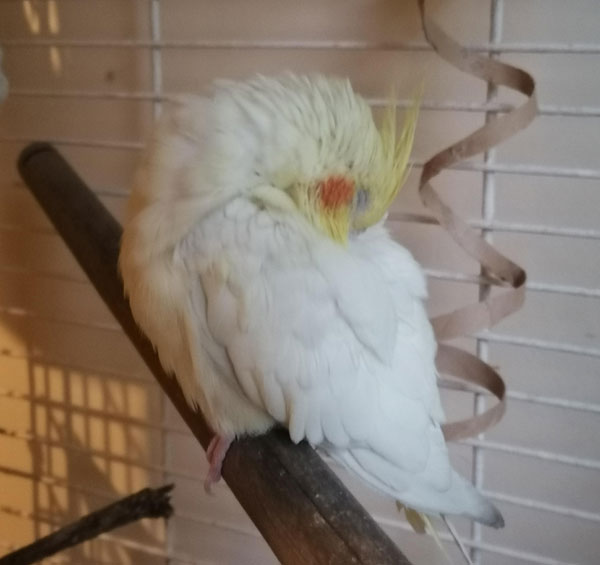
However, while sleeping is regular, if they begin to nap for too long or too frequently, it could suggest that they are ill. Suppose you notice other symptoms such as lack of appetite or change in their poop. It is also worth knowing the signs of a cockatiel not sleeping well. They include;
- They become cranky, aggressive, and highly squeaky when they do not get enough sleep.
- The cockatiel sleeps all day.
- If there are many in a cage, they may tend to fight each other often.
- Cockatiels tend to fall ill often if they do not get enough sleep.
FAQs
Here are other related questions.
Yes, cockatiels sleep all night. They are diurnal creatures that sleep at night and wake up when the sun comes up.
If you see your cockatiel with one leg up, its eyes closed, and its head tucked close to its chest, it is most likely sleeping.
Key Takeaways
Cockatiels sleep in various positions, some of which are uncommon but should not cause concern. Maintaining a warm room temperature, limiting noise and light, and keeping their cages clean will help your cockatiel(s) get adequate sleep.
Pay attention to any signs of distress the cockatiel may be experiencing and try to make the little fella’s life easier. Create a sleeping schedule that guarantees the cockatiel receives adequate sleep hours. I hope you now understand everything there is to know about cockatiel sleeping positions.
